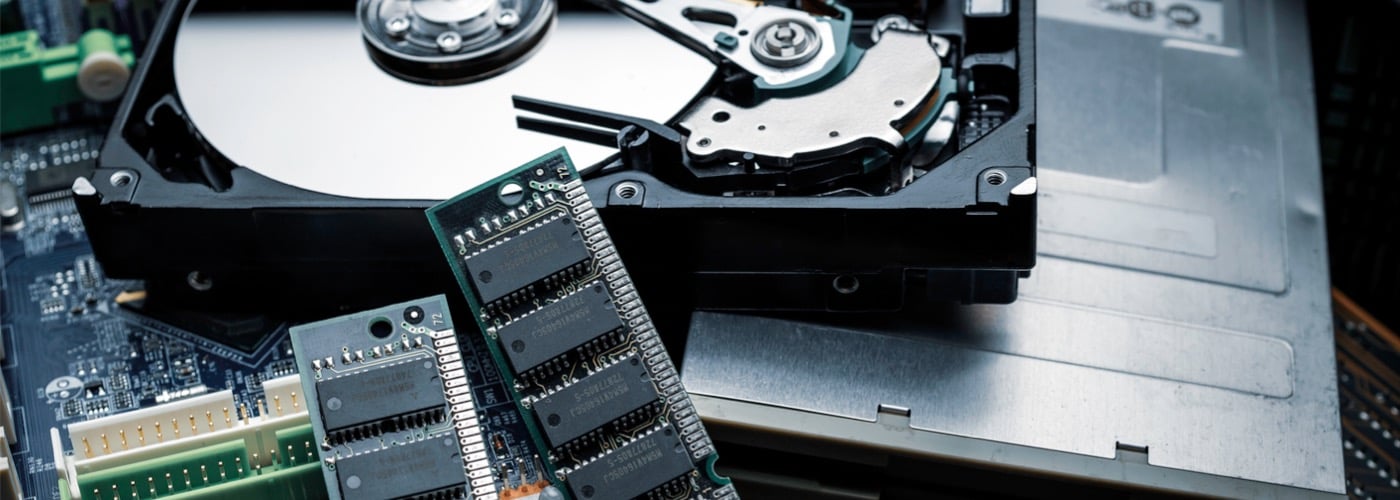E-waste Management in Schools
E-waste Management in Schools
The growing issue of e-waste management in schools is of critical importance. As our reliance on electronics and technology increases and the environmental problem of e-waste grows, teaching computer recycling in schools and creating e-waste activities for students should become education policy considerations.
You may be shocked to learn that nine million tons of electronic waste are sent to landfills each year in the US alone, and the global total for e-waste is an unbelievable 50 million tons per year.
The vast majority of electronic waste consists of plastic, silicone, and metal. It accounts for 70% of toxic waste generated, despite only representing around 2% of the total refuse we produce as humans.
It’s hard to find specific data for e-waste management in schools. However, the UK government estimates that secondary (high) school students produce around 22kg of waste each per year, with primary (elementary) students each producing around 45kg. And, while this will mostly consist of paper and food refuse, a proportion will undoubtedly be made up of electronic waste.
What are E-waste Activities for Students?
E-waste activities for students are – as the term strongly suggests – activities inserted into the curriculum which teach students skills such as improving computer recycling for schools and other methods of e-waste management in schools and at home.

The children growing up now are what we describe as digital natives. Starting with GenZ and then followed by successive generations – these young people will never know a world without the internet, social media, online shopping, smartphones, tablets, and other digital innovations.
This means throughout their lifetime, they will generate a steady stream of electronic waste, and so teaching them responsible methods for dealing with it should be a priority for parents and schools.
So, what e-waste activities for students can be developed by schools to teach students how to dispose of such equipment? It boils down to understanding some key concepts:
- The damage e-waste is causing to our environment
- How easy it is to recycle electronic devices
- Develop skills to repair or repurpose old electronics (maker movement)
- Understand that even a device that’s stopped working still has value
Schools can design lessons and practical exercises around understanding these concepts. Lessons can teach children about all the harmful metals and chemicals present in computers, smartphones, and other electronic devices and how these can leech into the soil and water supplies if they are not disposed of responsibly.
Computer recycling in schools can show students how even no longer functional computers can be broken down for spare parts and how their various components can be recycled into new products. Devices that are still functional can be donated to charities that redistribute them to communities that desperately need them. We can sometimes forget how important digital connectivity is to live today and must always be mindful of the millions of children and adults worldwide who don’t have access to a computer or the internet.
Getting children interested and involved in these processes will help reinforce the message of how vital e-waste management in schools and at home ensures a better future for everyone.

Make an Informed Decision
Steps to Proper E-waste Management in Schools
In order to teach children about the best way to facilitate computer recycling in schools and other facets of e-waste management, we need to establish the best steps to achieve it. What are the things we need to do to achieve the three broad goals we laid out in the previous section?
Maintenance
Teach students the importance of keeping electronic devices well maintained to keep them in good working order for as long as possible.
Data Destruction
Data is a very powerful resource in the modern world and can be used by criminals to commit identity fraud and a host of other malicious activities. A key learning point for any e-waste management program has to be to educate on the importance of the correct management and disposal of personal data held on electronic devices.
Sell/Donate
You can earn money to put back into your school by selling computer equipment that is no longer needed. Educate students on the value of old equipment even if they are no longer functional to appreciate the benefits of not simply throwing old devices away. Alternatively, old equipment can be donated to charities that specialize in refurbishing old computers and other pieces of electronic equipment and redistributing them to where they are most needed.
Visit Civic Institutions
Arranging trips to locations where e-waste recycling takes place can be one of the most rewarding e-waste activities for students. By seeing for themselves what happens to electronic waste once it leaves their possession will reinforce the importance of recycling and help increase awareness of the need for responsible e-waste management in schools.
Locate a Certified Company
Find an appropriate and licensed recycling partner like TechReset to dispose of any equipment which cannot be repurposed within your community. A certified company will have all the equipment and expertise necessary to dispose of electronic waste responsibly and adequately with the most environmentally sound methods possible.
Schools Approach This Issue
When it comes to computer recycling for schools, there are many different initiatives and approaches which have been put in place to emphasize the importance of the message to students.
One such initiative is Campus Race to Zero Waste (formerly, Recyclemania) which places universities in competition to minimize waste on campus and increase recycling uptake. It achieves this through a leaderboard competition and getting students to complete activities and act as advocates at their institutions.
The judging criteria involves:
- Creativity – The promotion was original or was done with a creative, original twist.
- Transferability – How easily could the promotion be replicated at other schools, and are planning and execution steps clearly explained for others to replicate.
- Results – What impact did the promotion have? How well can the case study quantify the number of people the promotion reached, a measured quantity of recycled or reduced materials, etc?
- Detailed and Concise – Case study communicates the important details concisely, allowing readers to understand enough to be able to replicate the event or activity.
- Part of Campus Race to Zero Waste (CR2ZW) Competition – The project/effort must be a part of the two-month competition timeframe (February/March).
- Photos or other creative materials – Photos, digital examples of creative materials or written outreach messaging related to the promotion are provided.
The program has been running for 20-years and is partnered with several well-known environmental groups such as the National Wildlife Federation and Rubicon.

Teaching Green Principles
By reaching students when they are young and driving home the message of responsible e-waste management in schools, we can help ensure they take these beliefs out into the world beyond graduation and do their part to make the world a more sustainable place to live for many generations to come.
E-waste activities for students are a great way to put this ethos into a real-world context, and by working with civic organizations and charitable groups such as Campus Race to Zero Waste, we can effectively move electronic waste recycling from the classroom to the real world.


See how we can solve your hard drive destruction needs
How TechReset Helps Educate the Local Community
TechReset supports our shared communities by working with reBOOT, a registered charity in Canada dedicated to refurbishing donated computer equipment for non-profits, charities and families. We work hard to give back to help extend access to computers for schools, organizations and families that need them. Donations from our clients provide equipment for programs like reSTART, which teaches basic computer skills, reSOURCE, which supplies refurbished workstations, reCONNECT to advance computer literacy for seniors, and reCYCLE that will repurpose or safely break down equipment into components. Contact us to learn more.